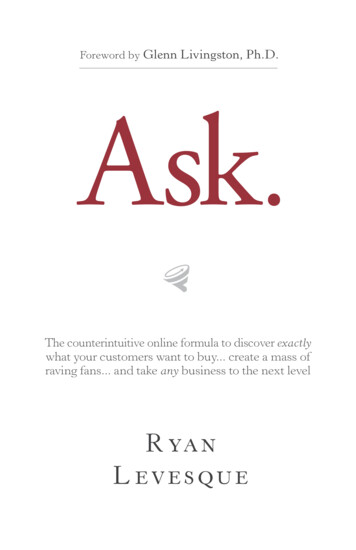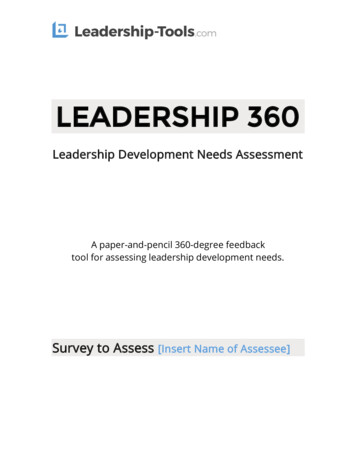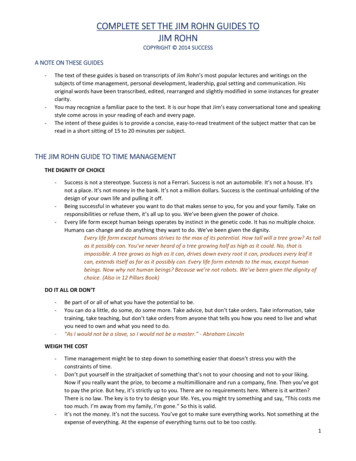
Transcription
AskQuestionsQuestions You Should AskAbout Your InvestmentsInformation is an investor’sbest toolASK QUESTIONS 1
2 ASK QUESTIONS
Ask QuestionsThat’s the best advice we can giveyou about how to invest wisely. Wesee too many investors who mighthave avoided trouble and lossesif they had asked basic questionsfrom the start.We encourage you to thoroughlyevaluate the background of any financial professional with whom youintend to do business—before youhand over your hard-earned cash.It doesn’t matter if you are a beginner or have been investing formany years, it’s never too early ortoo late to start asking questions.It’s almost impossible to ask a dumbquestion about how you are investing your money. Don’t feel intimidated. Remember, it’s your moneyat stake. You are paying for the assistance of a financial professional.ASK QUESTIONS 1
A good financial professionalwill welcome your questions, nomatter how basic. Financial professionals know that an educated client is an asset, not a liability. Theywould rather answer your questionsbefore you invest, than confrontyour anger and confusion later.In this brochure, you’ll findsome questions that you shouldask about investment products,the people who sell those products, and the people who provideinvestment advice to you. We’vealso included some tips on howto monitor your investments andhandle any problems.Keep this brochure on handwhen considering an investmentand use it by asking the right questions before you buy. Have a penand piece of paper ready to takenotes on the answers. They cancome in handy if there is a disputelater about what was said duringthe transaction. Taking notes alsosends a signal to your financialprofessional: I’m a smart and serious investor who wants to knowmore about the risks and rewardsof investing.2 ASK QUESTIONS
Investor TipWhich financial professional youselect is very important for severalreasons. You’ll want to investigatethoroughly before doing businesswith a financial professional or firmthat has a history of complaints orproblems with regulators. Also, youshould know that if your financialprofessional or his or her firm goesout of business or declares bankruptcy, you might not be able to recover your money—even if an arbitrator or a court rules in your favor.ASK QUESTIONS 3
Questions AboutProducts I s this investment product registered with the SEC and my statesecurities agency? D oes this investment match myinvestment goals? Why is this investment suitable for me? H ow will this investment makemoney? (Dividends? Interest?Capital gains?) Specifically, whatmust happen for this investmentto increase in value? (For example, increase in interest rates, realestate values, or market share?) W hat are the total fees to purchase,maintain, and sell this investment?Are there ways that I can reduceor avoid some of the fees that I’llpay, such as purchasing the investment directly? After all the feesare paid, how much does this investment have to increase in valuebefore I break even?4 ASK QUESTIONS
H ow liquid is this investment?How easy would it be to sell ifI needed my money right away? W hat are the specific risks associated with this investment? What isthe maximum I could lose? (Forexample, what will be the effect ofchanging interest rates, economicrecession, high competition, orstock market ups and downs?) H ow long has the company beenin business? Is its managementexperienced? Has managementbeen successful in the past? Havethey ever made money for investors before? I s the company making money?How are they doing comparedto their competitors? W here can I get more information about this investment? CanI get the latest reports filed bythe company with the SEC: aprospectus or offering circular,or the latest annual report andfinancial statements?ASK QUESTIONS 5
FOR MUTUAL FUNDS H ow has this fund performedover the long run? Where can Iget an independent evaluationof this fund? W hat specific risks are associated with this fund? W hat type of securities does thefund hold? How often does theportfolio change? D oes this mutual fund invest inany type of securities that couldcause the value to go up or downrapidly in a short period of time?(For example, derivatives?) H ow does the fund perform compared to other funds of the sametype or to an index of the sametype of investment? H ow much will the fund chargeme when I buy shares? Whatongoing fees are charged? Howmuch will the fund charge mewhen I sell shares? I s the fund portable? If I movemy assets to another firm, will Ibe able to continue holding thefund or will I need to liquidate it?6 ASK QUESTIONS
Investor TipYou can verify your broker’s disciplinary history by checking theCentral Registration Depository(CRD). Either your state securitiesregulator or FINRA can provide youwith CRD information. Your statesecurities regulator may give youmore information from the CRDthan FINRA, especially when itcomes to investor complaints, soyou may want to check with themfirst. You’ll find contact informationfor your state securities regulatoron the website of the North American Securities Administrators Association at www.nasaa.org. Tocontact FINRA, visit FINRA’s BrokerCheck website at www.finra.org, or call them toll-free at (800)289-9999.ASK QUESTIONS 7
Questions AboutThe People WhoSell Investments A re you registered with our statesecurities regulator? Have youever been disciplined by the SEC,a state regulator, or other organization (such as FINRA) or one ofthe stock exchanges)? H ow long has your firm been inbusiness? How many arbitrationawards have been filed againstyour firm? W hat training and experience doyou have? How long have you beenin the business? What other firmshave you been registered with? Whatis the status of those firms today? H ave you personally been involved in any arbitration cases?What happened? W hat is your investmentphilosophy? D escribe your typical client.Can you provide me with somenames and telephone numbersof your long term clients?8 ASK QUESTIONS
H ow do you get paid? By commission? By the amount of assetsyou manage? By another method? D o I have any choices on howto pay you? Should I pay youby the transaction? Or a flat feeregardless of how many transactions I have? D o you make more if I buy thisstock (or bond, or mutual fund)rather than another? If you weren’tmaking extra money, would yourrecommendation be the same? A re you participating in a salescontest? Is this purchase really inmy best interest, or are you trying to win a prize? Y ou’ve told me what it costs meto buy this stock (or bond, ormutual fund); how much will Ireceive if I sell it today? W here do you send my order to beexecuted? Can we get a better priceif we send it to another market? I f your broker changes firms,ask: Did they pay you to changefirms? Do you get anything forbringing me along?ASK QUESTIONS 9
Questions Aboutthe Progress ofYour Investments H ow frequently do I get statements? Do I understand whatthe statement tells me? I s the return on my investmentmeeting my expectations andgoals? Is this investment performing as I was led to believe? H ow much money will I get backif I sell my investment today? H ow much am I paying in commission or fees? H ave my goals changed? If so,are my investments still suitable? W hat criteria will I use to decide when to sell?10 ASK QUESTIONS
Investor TipWhen you ask these questions,write down the answers you receive and what you decided to do.If something goes wrong, yournotes can help to establish whatwas said. Let your financial professional know you’re taking notes.They’ll know you’re a seriousinvestor and may tell you more.ASK QUESTIONS 11
How to HandleProblemsAct promptly! By law, you onlyhave a limited time to take legalaction. Follow these steps to solveyour problem:1. T alk to your financial professional and explain the problem.Where is the fault? Were communications clear? Refer toyour notes. What did the financial professional tell you? Whatdo your notes say?2. I f your financial professional can’tresolve your problem, then talk tothe financial professional’s supervisor (which, for brokers, is oftenthe firm’s branch manager).3. I f the problem is still not resolved, write to the compliancedepartment at the firm’s mainoffice. Explain your problemclearly, and how you want it resolved. Ask the compliance office to respond to you within 30days. If you’re still not satisfied:12 ASK QUESTIONS
4. S end a copy of your letter to yourstates securities administrator orto the Office of Investor Education and Advocacy at the SEC.At the SEC, we will researchyour complaint, contact the firm orperson you have complained aboutand ask them to respond to yourspecific complaint or question.Sometimes our intervention yieldsa satisfactory result. If these stepsdon’t work, you may need to takelegal action on your own. We cansend you information on mediationand arbitration, and suggest how tolocate a lawyer if you need one.ASK QUESTIONS 13
Notes14 ASK QUESTIONS
ASK QUESTIONS 15
How to Contactthe SEC withQuestions orComplaintsContact the SEC’s Office of InvestorEducation and Advocacy for help. Ifyou have access to the Internet, youcan send us your complaint by using our online complaint form atwww.sec.gov/complaint.shtml.Or you can reach us as follows:U.S. Securities and Exchange CommissionOffice of Investor Education and Advocacy100 F Street, NEWashington, DC 20549-0213Telephone: (800) 732-0330www.investor.govTo order a copy of this publication, pleasevisit www.pueblo.gsa.gov. To order byphone, call the Federal Citizen InformationCenter at (888)878-3256 Monday-Friday8am to 8pm ET.16 Ask Questions
ASK QUESTIONS 17
OFFICE of INVESTOREDUCATION and ADVOCACY1-800-732-0330www.investor.govSEC Pub. 001 (01/11)18 Ask Questions
would rather answer your questions before you invest, than confront your anger and confusion later. In this brochure, you’ll find . some questions that you should ask about investment products, the people who sell those prod-ucts, and the people who provide investment










